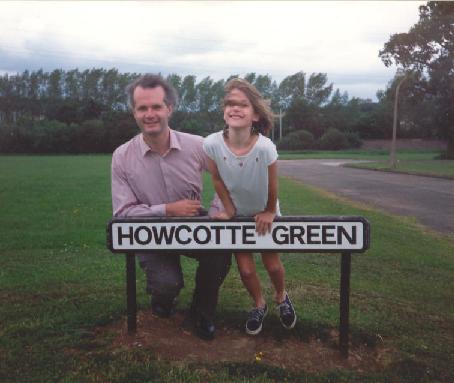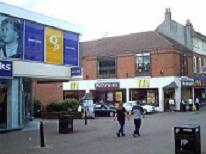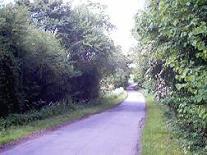|
Place names |
|
Howcotte Green, Coventry,
Warwickshire
One
of a number of roads on a housing estate south east of Tile Hill station named after
former Mayors of Coventry. William Howcott(e) was
Mayor of Coventry in 1592. Howcutt's Corner, Kettering,
Northamptonshire
In
1808, the Vestry of Kettering decided to have the public roads cleaned by
private contract. "Howcutt's Corner" was a location delimiting two
of the districts into which the Town's roads were divided for that purpose.
It was approximately the mid-point along the High Street, where it is joined
by Meadow Road - then known as Goosepasture Lane. The
open fields of Kettering were enclosed in 1804. This involved a Robert
Howcutt - almost certainly one of those mentioned under the heading
"Howcutt's Yard". He made no personal claim to be allocated land,
but the Commissioners' calculations do include him as a claimant. From their
evidence, he had a cottage with about one-tenth of an acre of old enclosure
and the right to pasture two cows on the Common, but he had no fieldland. There is no evidence in these records of where
he lived. Robert's compensation for loss of common rights was assessed, after
the usual deductions, at an annual value of 15.67 shillings and in the
enclosure rate list it is recorded that he paid his levy of £1.4.9d. However,
the half-acre or so due to him was not allotted, so he was presumably one of
those cottagers who sold his interest before the land was divided up (1). Howcutt's Yard
& Howketts, Finedon, Northamptonshire "Mrs Mona Warner's premises (in the High
Street) stand on the site of a homestead owned in 1721 by Joseph Eayre (Eyre), which by 1806 had become a house and shop
owned by Richard Vincent. Soon afterwards it became the farm homestead of
Robert Howcutt. In 1851 it was the home of William Warren, a millwright, by
which time cottages had been built in the yard behind. These were variously
known as Warren's Yard and Howcutt's Yard." (2) Robert Howcutt (c1744-1815) was an overseer of the
poor at Finedon in 1791 and a churchwarden there in
1792. His son, another Robert Howcutt (1778-1846), was overseer of the poor
at Finedon in 1822 and 1831. He would have been the
Robert Howcutt who appears in the Finedon Dole Book
in 1831 as a farmer residing, along with three females, in the premises that
had been Joseph Eyre's homestead. The 1837 valuation book of the parish
states that Robert Howcutt was the tenant of that homestead (owned by Rev.
William Alington) and that Robert Howcutt owned 24
acres in the North East Field. In the Hall Sale Catalogue (1912), this land
was known as "Howketts" (3). Howcut Lane, Yardley Hastings,
Northamptonshire
Shown
on Bryant's map (1823) as "Howcott Lane". This road is now called
"Howcut Lane" and is the southern continuation
of Chase Park Road. Howcott Property,
Baton Rouge, Louisiana, USA - A subdivision in the city of Baton Rouge. Howcott, Grant
parish, Louisiana, USA - Location of a
head-on train crash on 5 September 1924 in which five people were killed and
five injured. Howcott,
Chowan county, North Carolina, USA - On 9 August 1796,
Richard Hoskins of Chowan county made his will. Amongst the bequests was
"the land and plantation called Howcott likewise my part of the
watermill", which he left to his son Richard (4). Hocutt Road, Durham,
North Carolina - On
the eastern outskirts of the city, near Falls Lake State Park. Howcutt Street,
Trenton, Ontario, Canada - A public
meeting was held about an application to open, then close and sell to an
adjoining owner a portion of Howcutt Street extending about 110 feet north
from Dixon Drive (5). This street was presumably named after John Howcutt,
who appears in the 1871 census of Trenton. Howcut Road, Yuba county,
California, USA - Connects Honcut Road with Loma Rica Road, just south of the border
with Butte county. Notes
(1)
From correspondence with R A Martin (2)
"Finedon otherwise Thingdon"
by John L H Bailey (Finedon, 1975) (3)
From correspondence with John L H Bailey (4)
Chowan county will book A, page 353 – transcription
of will. (5)
Minutes of City of Quinte West Council, 4 November
2002. |
|
|
|
|


